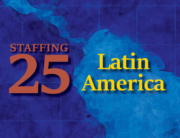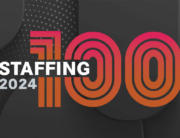As advances in technology continue to evolve and reshape the staffing industry, women are increasingly taking on leadership roles. Penny Queller, senior vice president and general manager of staffing for Monster, has seen women’s contributions up close in her more than 20 years in staffing. She discusses her path in the industry, the contributions that women have made and continue to make, and what she learned along the way.
Q: In your 20-plus years in recruiting and staffing, how have women shaped the industry?
A: Women have long been staffing leaders, as strategists and entrepreneurs, as doers, innovators and dreamers. They have led global powerhouses. They have sold and merged companies.
I have seen close friends and colleagues carve entire 30-plus-year careers in our industry. Some quickly rise to the top of the organizational chart, while others plateau in middle management and grace the industry with their steadfast leadership. My first job in the industry was working for a female entrepreneur, Karen Faber, who led a startup called US Personnel. Women in staffing have carved career paths for people like me to grow and develop our business acumen and our leadership and strategic skills. All of us have put millions of people to work over the years, coaching, counseling and guiding people to success.
Q: Who are some of your female role models in staffing?
A: My role models include people like Joyce Russell at Adecco, Lesa Francis at Supplemental Health Care, Rosaleen Blair with Alexander Mann Solutions and, most recently, Linda Galipeau with Randstad.
I worked for Joyce Russell during what I consider my richest developmental years, from the time I was about 25 to my early 30s. That’s when I developed my business acumen and leadership skills. Joyce invested both time and money in me, and I’m forever grateful to her. She would show up and be available to me. She sent me to training, such as [Stephen] Covey’s 7 Habits of Highly Effective People. I continue to draw on those fundamental building blocks that she gave me 20 years ago.
These women have all influenced the leader I am today. Like them, I spent my career listening to recruitment leaders to better understand their global objectives and challenges. And I’m eager to find new ways to address those needs in my current role at Monster.
Q: What do you see as some of the challenges facing women in staffing today?
A: The challenges that exist in staffing are the same for anyone — whether you’re a woman or a man. The main challenge is the digital disruption that is happening. I don’t know that any other challenge even compares to it. As business models are interrupted by disruptive technologies, the most valuable leaders in staffing will focus on accelerating their organizations — creating profit from the challenges these technologies pose.
Q: What else do women need to do to drive their staffing businesses forward?
A: We need to understand and embrace emerging technologies that reduce time-to-hire. Those of us in staffing are not going to be the ones writing code, but we have to demonstrate a robust understanding of the capabilities, applications and the future potential of emerging technologies. I also think women are exceptional in their ability to bring people and technology together. There is an opportunity for women in staffing to leverage that strength. For example, how can we delegate recruiting tasks between humans and machines in a way that maximizes the unique capabilities of each? There’s an anxiety about artificial intelligence and machine learning, but I believe we can embrace those technologies to grow our businesses — turning challenge into opportunity.
Q: How do you see the current staffing outlook? What are the industry’s most pressing needs?
A: In general, it’s a very strong outlook — but we must innovate, evolve and think globally. My first corporate CEO was John Bowmer at Adecco, and he taught me the phrase, ‘Better, faster, cheaper.’ It’s fascinating that it’s 100% applicable today, although I don’t think he was thinking about artificial intelligence and machine learning in the late ’90s.
Another pressing need in staffing is thinking constantly of our candidates, like we think of our clients. Finding a great job should be mobile-enabled and frictionless. Candidates will use their phones to see job opportunities, see the deposit in their bank account, get the directions to their next assignment, check who the manager is and submit their time card. Make challenges easy — don’t make them hard.
Q: What opportunities do you see ahead that will address the evolving needs of the staffing industry? What roles do you see women playing in this changing ecosystem?
A: I think the term ‘evolving’ is key: The staffing industry has already evolved significantly, but it’s going to continue to do so at a faster pace. The Holy Grail is recruiter productivity, and staffing companies are looking for solutions that will improve efficiency and capacity for recruiters.
At Monster, this client need is at the forefront of our innovation agenda. Monster can tap big data to create a constant flow of candidates for staffing firms, particularly firms that work in volume.
As we tackle these big challenges in staffing, I think there are a couple of areas that women are uniquely positioned to lead. I think that demonstrating EQ, or emotional intelligence, is critical. We have all met people who are naturally gifted at controlling or recognizing their emotions, and they understand how to put others in a comfortable place. The more that staffing leaders can hone their EQ, the faster we can evolve and collaborate.
Q: What are some lessons you learned as you advanced in your career?
A: I have learned how to be comfortable with chaos. I have learned that if I can do this, the result could be reinventing a process that will make us better prepared for the future. In staffing, there are systems that we all built that were fantastic for 2005 or 2010, but they’re simply not nimble enough to match the pace of change we’re seeing now.
As far as my career path goes, I have noticed that when I am willing to take a risk, the results far exceed my expectations. For me, there is a direct correlation between risk-taking and growth and sheer pleasure in running to your desk in the morning. Some of it is backbreaking and emotionally draining. But when you achieve a really big milestone and look back, there’s nothing more exhilarating — especially when you are collaborating with tens and sometimes hundreds of people to push an initiative uphill.
Q: What advice would you give to women who are entering the staffing industry, as well as to staffing veterans such as yourself?
A: Challenge yourselves to think of new solutions. In the past, we focused on executing predetermined strategies and increasing efficiency. But one of the most valuable things for the future is our ability to create something entirely new. The business models that we know today in staffing are being reinvented by disruptive technologies. The most valuable leaders of our space will shape the influence of those changes. There’s a risk that staffing could be marginalized by digital disruption. Our commitment is not to let that happen. Monster will be the one job board focused on accelerating the staffing industry.






